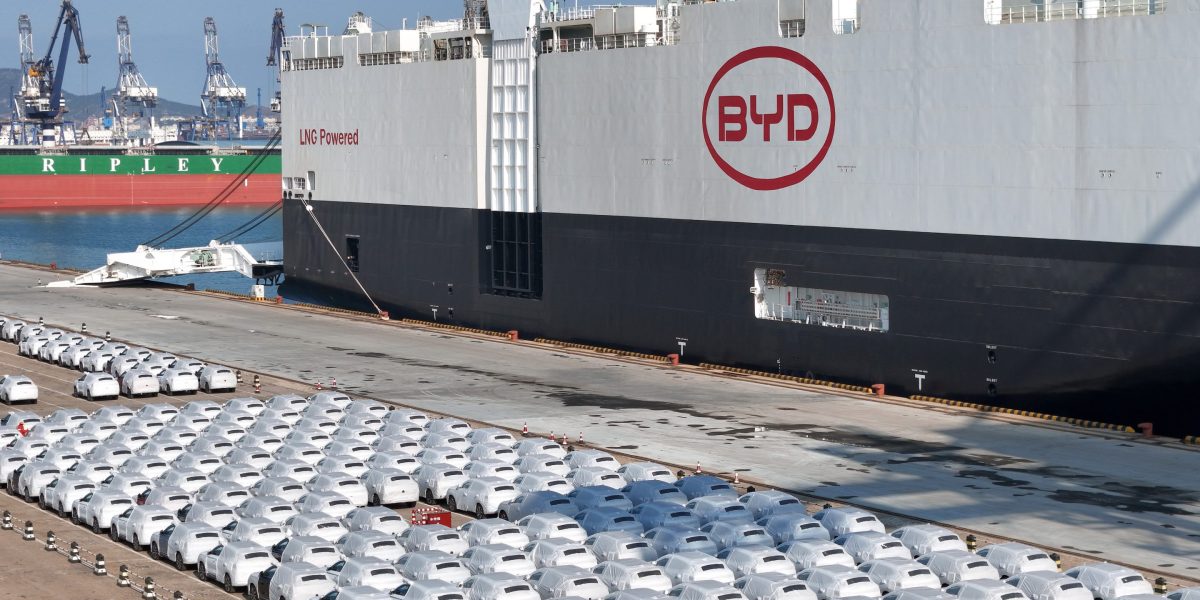China might have problems with its economy, but as an exporter of affordable electric vehicles, it’s on a tear. Now, investigators from the European Commission will visit Chinese EV makers as part of a probe into whether they have an unfair advantage thanks to government subsidies.
In the coming weeks, the EU investigators will visit BYD, Geely, and SAIC, according to Reuters. Their visits will help determine whether the EU imposes higher tariffs to protect European carmakers.
BYD recently overtook Elon Musk’s Tesla as the global leader in sales of electric vehicles. Backed by Warren Buffett’s Berkshire Hathaway, the carmaker keeps its costs low partly by owning the entire supply chain of its EV batteries, significant since a battery accounts for roughly 40% of an electric vehicle’s price.
But as the existence of the EU’s anti-subsidy investigation suggests, many worry there’s more than supply-chain efficiencies behind the low prices of Chinese EVs. The visits promise to be central to the EU probe, announced in September and set to run for 13 months.
This is the best summary I could come up with:
Now, investigators from the European Commission will visit Chinese EV makers as part of a probe into whether they have an unfair advantage thanks to government subsidies.
But as the existence of the EU’s anti-subsidy investigation suggests, many worry there’s more than supply-chain efficiencies behind the low prices of Chinese EVs.
Earlier this month, Beijing, in what appeared to be a tit-for-tat move, launched an anti-dumping probe into brandy imported from the EU, sending shares of France’s Remy Cointreau and Pernod Ricard tumbling.
An Allianz Trade report last year said that China’s EV makers pose a significant threat to Europe’s carmakers, particularly the “automotive-dependent economies of Germany, Slovakia and Czech Republic.” The report called for higher tariffs on Chinese EVs, estimating they could cost Europe’s carmakers 7 billion euros a year in lost profits by 2030.
Tesla CEO Elon Musk has gone from laughing about the quality of BYD cars in 2011 to suggesting recently that Chinese companies will emerge as dominant players in the global automotive industry.
In the EU, Chinese EV makers face 10% tariffs, versus 27.5% in the U.S. That’s encouraged them to target Europe as their home market gets increasingly crowded, although they’re also growing in Southeast Asia, Mexico, Australia, and elsewhere.
The original article contains 510 words, the summary contains 206 words. Saved 60%. I’m a bot and I’m open source!
Here’s a fun fact: 85% of China’s government spending is by local governments (provincial and below). China’s federal support for EVs has been mostly limited to reducing taxes and fees on EV manufacturing (most notably, removing the consumption tax that is charged on automobiles).
If removing tax barriers is a government subsidy, I guess the EU claim has some water. Otherwise, the EU will be stuck whack-a-moling particular provinces for their economic incentives (and, of course, ignoring the billions that Tesla has received).
So when BYD gets tax cuts and some subsidies to build factories it’s anti competitive
But when Tesla does the same then it’s fine?
Make it make sense.
For the sake of argument, picture BYD getting much larger subsidies that allows it to sell EVs for half the price of anything European autos can sustainably produce. As a result Europeans overwhelmingly buy BYD over European EVs. Given that EVs are mandated to be the vast majority of cars sold in the near future, that’s Europeans buying very few European cars. Picture this persisting over long enough period to exhaust any savings European autos have. Such an event would result in a significant devaluation of European autos as well as outright bankruptcies. Followed by many thousands of Europeans losing well paying union jobs. Followed by BYD scooping up European autos brands and assets. If you see the downsides for Europe in this picture, perhaps you’d see why you or the EC might care differently about European autos subsidies versus Chinese ones. Perhaps this makes it make sense.
Tesla is not a european car maker.
Tesla is headquartered in an ally of the EU; BYD isn’t. Maybe Tesla’s subsidies are a problem to the EC - I don’t know. But you’re looking at it in a slightly simple way, as if it’s very important that this process needs to be fair.
It doesn’t need to be fair; it needs to be good for the EU. Is it good for the EU to impose tariffs on subsidised Chinese vehicles coming in (if indeed they are subsidised)? Quite possibly. (Quite possibly not: how important is it to have a big car manufacturing industry, versus your population having cheaper cars?) Whether it would also be good to impose tariffs on Tesla vehicles is also a valid question to ask, but those questions don’t have to have the same answer.
I am honestly not happy with american cars flooding our markets either, so I’d rather get rid of both :)
Exactly. I don’t get why it’s a big deal unless there could be some situation where they’re avoiding getting tied to a contract that could see a huge price hike.
the carmaker keeps its costs low partly by owning the entire supply chain of its EV batteries, significant since a battery accounts for roughly 40% of an electric vehicle’s price.
And this impossible for other carmakers because… ?
Because the government of China owns most of the world’s rare earth mines.
The article doesn’t suggest it’s impossible. It’s difficult because you have to build up a competitive business from nothing in addition to the one you’re already building up.
And generally you have to come up with the money to build it yourself or from the private sector, for a venture that won’t be making much money itself. And then say you somehow manage to build the vertical, in our loosely regulated free market economy, this vertical is likely to have monopolistic power over the market, which is bad for people in the system, apart from the ones participating in the vertical.
I’m not advocating that our loosely regulated free market economy is good BTW. I’m simply trying to state its implications on vertical integration and vice versa. Vertical integration is clearly more efficient than the alternative, but free market economies allow it to create harmful effects.
Wow, fuck the european commission i guess. Subsidize your own EV’s.
Grasping at straws. as if German automakers hadn’t received many subsidies and tax exemptions .
Europeans like to pay premium for the prestige of driving German made cars. now if those Chinese EV make it to Europe, they will bring havoc on premium’s cars market share especially in these very challenging times.






